On My 2018 Bookshelf: Some Great Books for the New Year
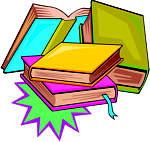 Many of us have a bookshelf filled with our New Year’s “to-be-read” books. Here are six of mine – interesting and informative resources to jump-start 2018. All contain concepts about the human brain and successful learning. You can read or just skim them and still find something to use in your own personal or professional life. Happy New Year!
Many of us have a bookshelf filled with our New Year’s “to-be-read” books. Here are six of mine – interesting and informative resources to jump-start 2018. All contain concepts about the human brain and successful learning. You can read or just skim them and still find something to use in your own personal or professional life. Happy New Year!
Full Disclosure: I usually don’t read a non-fiction book cover-to-cover. Instead, I skim, skip around, and mark up anything that catches my interest. Then, at some point, I’ll go back and revisit the book, reading it more thoroughly the second (or third) time around and making notes about how I want to apply what I’ve learned. So the books I’ve listed below are mostly ones I’ve skimmed but need to do a second, more thorough reading.
Also, this is by no means a complete list of my “to-be-read” books for 2018. I just want to begin the year with these. You probably have your own list of great resources you want to explore, as well. If you want to email me with some of your favorite titles and summaries, I’ll share them in another blog post (and list your name and contact information there, if you wish). 🙂
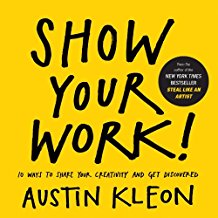 1. Show Your Work: 10 Ways to Share Your Creativity and Get Discovered by Austin Kleon. I love this book! It is about SO much more than getting discovered; it’s about a generosity of spirit, paying it forward, and becoming really good at what you do by sharing it all with others so that they can become really good at what they do. In my mind, this book connects to successful learning because Kleon says that what really works is to: “teach what you know,” “think process, not product,” “tell good stories,” and “don’t quit your own show.” Although I have already read this book (a super-easy read with a fun, energetic format), I plan to revisit it and to put more of it into practice for 2018. Kleon’s excellent older book Steal Like an Artist: 10 Things Nobody Told You About Being Creative is also on my 2018 list. Click HERE for Austin Kleon’s website.
1. Show Your Work: 10 Ways to Share Your Creativity and Get Discovered by Austin Kleon. I love this book! It is about SO much more than getting discovered; it’s about a generosity of spirit, paying it forward, and becoming really good at what you do by sharing it all with others so that they can become really good at what they do. In my mind, this book connects to successful learning because Kleon says that what really works is to: “teach what you know,” “think process, not product,” “tell good stories,” and “don’t quit your own show.” Although I have already read this book (a super-easy read with a fun, energetic format), I plan to revisit it and to put more of it into practice for 2018. Kleon’s excellent older book Steal Like an Artist: 10 Things Nobody Told You About Being Creative is also on my 2018 list. Click HERE for Austin Kleon’s website.
2. 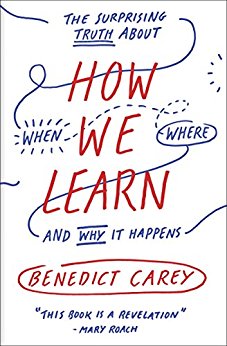 How We Learn: The Surprising Truth about When, Where, and Why It Happens by Benedict Carey. Again, I’ve read this book and plan to revisit it so that I can put more of its excellent concepts into practice in my own teaching/training work. Carey’s interesting and informative chapters include: “The Power of Forgetting,” “Spacing Out,” “The Upside of Distraction,” and “Quitting Before You’re Ahead.” Everything Carey writes about can be applied to both formal and informal learning experiences. This is truly a transformational book! Click HERE for a New York Times article about author and journalist Benedict Carey.
How We Learn: The Surprising Truth about When, Where, and Why It Happens by Benedict Carey. Again, I’ve read this book and plan to revisit it so that I can put more of its excellent concepts into practice in my own teaching/training work. Carey’s interesting and informative chapters include: “The Power of Forgetting,” “Spacing Out,” “The Upside of Distraction,” and “Quitting Before You’re Ahead.” Everything Carey writes about can be applied to both formal and informal learning experiences. This is truly a transformational book! Click HERE for a New York Times article about author and journalist Benedict Carey.
3. Make It Stick: The Science of Successful Learning by Peter C. Brown. I picked up this book some time ago and need to really explore its concepts because Brown and his co-authors illustrate how misunderstood the process of learning is and how traditional instruction is often detrimental to successful learning. He writes about avoiding “illusions of knowing,” and also covers embracing difficulties, mixing up the practice, and getting beyond learning styles. Everything he writes about makes a great deal of sense to me.
4. Wired for Story: the Writer’s Guide to Using Brain Science to Hook Readers from the Very First Sentence by Lisa Cron. 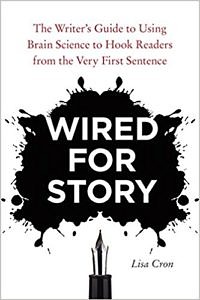 This interesting book isn’t just for writers; it’s for anyone who wants to grab the attention of an audience and make them want more of the story, the information, or the learning. The “cognitive secrets” in Cron’s book are informative, interesting, and compelling (and make for great reading!). Her cognitive secrets are also specifically applicable to successful adult instruction. For more about Lisa Cron, click HERE.
This interesting book isn’t just for writers; it’s for anyone who wants to grab the attention of an audience and make them want more of the story, the information, or the learning. The “cognitive secrets” in Cron’s book are informative, interesting, and compelling (and make for great reading!). Her cognitive secrets are also specifically applicable to successful adult instruction. For more about Lisa Cron, click HERE.
5. Brain Rules for Aging Well: 10 Principles for Staying Vital, Happy, and Sharp by John Medina. You probably know Medina from his most famous best-selling book Brain Rules: 12 Principles for Surviving and Thriving at Work, Home, and School. Medina is a fabulous story-teller and writer (as well as a molecular biologist) whose books are profoundly applicable to any learning environment. While Medina’s book on aging takes more of a life-style approach to the brain, his chapters about connections, brain-training, and memory (“It’s Never Too Late to Learn – or to Teach”) are well worth reading. Click HERE to visit Medina’s website and view information about his other books and free videos.
6. Learner-Centered Teaching: 5 Key Changes to Practice by Maryellen Weimer. This is a textbook for more formal classroom instruction. It’s a book that I’ve skimmed and now want to go back to read in-depth. Weimer divides her book into two parts: “What Changes When Teaching is Learner-Centered” and “Implementing the Learner-Centered Approach.” While her book was originally written for college educators, I’ve found that much of it is also applicable to adult instruction in general.
***************************************
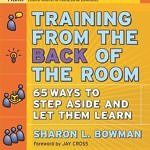 For my books about the science of successful brain-based learning and instruction, click HERE. For free downloadable articles, click HERE. And for the 2018 calendar of “Training from the BACK of the Room” classes, click HERE or HERE and scroll down. Check back because classes are added monthly. And feel free to email me with any questions or comments ([email protected]).
For my books about the science of successful brain-based learning and instruction, click HERE. For free downloadable articles, click HERE. And for the 2018 calendar of “Training from the BACK of the Room” classes, click HERE or HERE and scroll down. Check back because classes are added monthly. And feel free to email me with any questions or comments ([email protected]).